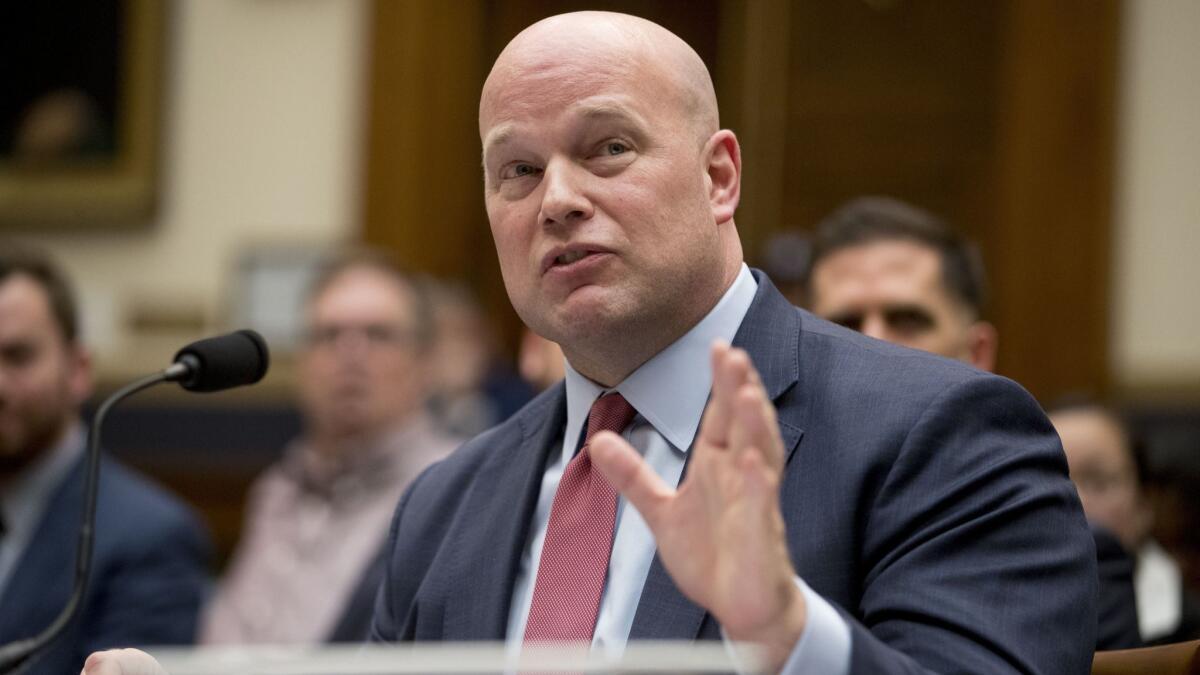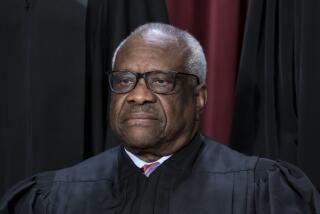Whitaker ‘did not deny’ talking to Trump about Cohen case, top Democrat says

- Share via
The House Judiciary Committee’s Democratic chairman said former acting attorney general Matthew Whitaker “did not deny” Wednesday that President Trump reached out to him to discuss a case against his former lawyer Michael Cohen, raising new questions about whether Trump attempted to obstruct proceedings concerning his personal and business matters.
Rep. Jerrold Nadler (D-N.Y.) presented Whitaker’s comments during their closed-door meeting as a contradiction of his public congressional testimony in February, when Whitaker said Trump never expressed his dissatisfaction with Cohen for pleading guilty to various financial crimes and lying to Congress. When asked at that hearing whether he had discussed the Cohen case with Trump, Whitaker refused to answer.
“Unlike in the hearing room, Mr. Whitaker did not deny that the president called him to discuss the Michael Cohen case and personnel decisions in the Southern District,” Nadler said following his meeting with Whitaker on Wednesday, referring to the U.S. attorney’s office for the Southern District of New York, which brought the case against Cohen.
The committee’s ranking Republican, Rep. Douglas Collins of Georgia, who was present for Wednesday’s interview with Whitaker, called Nadler’s summary an “interpretation” and “overreach,” while a Republican staff lawyer also present for the meeting said Whitaker simply could not remember ever conversing with Trump about Cohen’s case.
RELATED: Trump denies he asked Whitaker if an ally could oversee Cohen inquiry »
Whitaker did not respond to a request for comment. The White House declined to comment.
According to Nadler, Whitaker did not deny that he had been “directly involved in conversations about whether to fire one or more U.S. attorneys.” He also did not deny that he had been “involved in conversations about the scope” of U.S. Attorney Geoffrey Berman’s recusal from the Cohen case, Nadler said, and whether subordinate prosecutors at the Southern District of New York “went too far” pursuing the campaign finance case in which Cohen has implicated Trump.
Collins stressed that Whitaker engaged in internal discussions only with his own staff about the employment of U.S. attorneys, during the regular course of carrying out his duties as acting attorney general.
“To imply that there’s anything nefarious there is a way overreach of anything that was discussed,” Collins said.
He also said that Whitaker “never had any conversations with the Southern District of New York about any case while he was acting attorney general.”
Wednesday’s meeting was not transcribed, complicating the matter of resolving Nadler’s and Collins’ diverging interpretations of Whitaker’s account.
But Whitaker’s non-denials are raising questions among Trump’s critics about whether his public testimony was accurate — and whether Trump ever expressed to his acting attorney general any discontent with the handling of a case in which the president’s former confidant implicated him in wrongdoing.
RELATED: Matthew Whitaker, former acting attorney general, leaves Justice Department »
Whitaker took over the Justice Department a few days after the midterm elections, replacing former attorney general Jeff Sessions until William Barr was confirmed for the job last month. His tenure was a lightning rod for partisan infighting, as Democrats questioned whether someone who had voiced such public skepticism over special counsel Robert S. Mueller III’s probe of Russia’s election interference could be trusted to oversee that work.
Whitaker has denied ever using his position either to limit Mueller’s investigation or give an advantage to Trump. During Wednesday’s hearing, Nadler said that, “as far as we know, our fears weren’t borne out” on that front, according to Republican and Democratic committee aides.
Nadler had promised in a late-February letter to Whitaker to follow up with him about purported omissions during his public testimony. It is unclear whether the committee’s leaders will seek to schedule Whitaker for additional testimony, but Republicans remain opposed to spending any more time investigating Whitaker’s actions.
After the meeting, Nadler would say only that he planned to “analyze the new revelations and see where they lead.”
Karoun Demirjian writes for the Washington Post.
More to Read
Sign up for Essential California
The most important California stories and recommendations in your inbox every morning.
You may occasionally receive promotional content from the Los Angeles Times.












